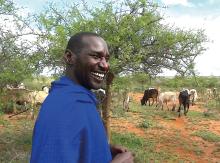Land Library
Welcome to the Land Portal Library. Explore our vast collection of open-access resources (over 74,000) including reports, journal articles, research papers, peer-reviewed publications, legal documents, videos and much more.
/ library resources
Showing items 1 through 9 of 74.Kenya Land Alliance (KLA) in partnership with Indigenous Livelihoods Enhancement Partners (ILEPA) and through the support of the Global Green Grants is implementing a project on Climate change, Livelihoods, and energy targeted at Women and Youth in Narok County.
This booklet reveals that women only got 103,043 titles representing 10.3 percent, while men got 865,095 titles representing 86.5 percent of the total. The glaring disparity is made clear when looked at against the actual land sizes and titled for women against men.
Access to land is key to achieving food security, poverty alleviation, social equity and environmental protection. A brief insight in land governance-related principles and policies of the German development assistance.
Following the end of apartheid, South Africa’s government set itself ambitious goals with a planned land reform. However, there have since been barely any changes in the country’s agricultural structure, and the positive impacts that were hoped for on rural livelihoods have hardly materialised.
The year 2016 marks 15 years since the new wave land reforms became operational in Tanzania. Despite its ambitious goals – encouraging land registration and titling, and empowering women and other vulnerable groups – the results are disillusioning.
Secure tenure of farming and forest land is increasingly recognised as an important factor of household food security and nutritional status. This is borne out by a study by the Laotian Land Issues Working Group.
Sierra Leone is one of the least developed countries in the world and is still recovering from a civil war that ended in 2002.
The buying up of farmland by international investors is viewed highly critically. However, sweeping judgements could be inappropriate, as our author demonstrates with survey results from Ethiopia and Uganda.
Formal land titles are rare in pastoral communities around the world. In the past, this presented hardly any problems, since pastoral land was seen as of little use by most outsiders.









